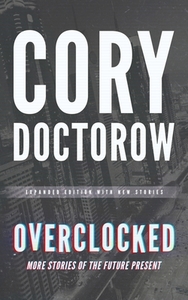Take a photo of a barcode or cover
What it comes down to is that I really like what Cory Doctorow has to say about copyright laws, monopolies, information privacy, etc. It’s a breath of fresh air to have someone explain what’s going on in the world in understandable terms. His fiction by extension tackles these topics as well.
My one critique, if I have one, is that all of Doctorow’s 3D printing hacktivist protagonists are a bit one note in the same way that Asimov’s golden era “Men of Science” are. They only exist as a transmission device for the author’s personal ideologies. But for Doctorow’s case I find the questions he poses to be timely, interesting, and a needed perspective on the current state of technology and its ramifications.
My one critique, if I have one, is that all of Doctorow’s 3D printing hacktivist protagonists are a bit one note in the same way that Asimov’s golden era “Men of Science” are. They only exist as a transmission device for the author’s personal ideologies. But for Doctorow’s case I find the questions he poses to be timely, interesting, and a needed perspective on the current state of technology and its ramifications.
I'm a big fan of Cory Doctorow, not just because of his writing, but also because of his activism for intellectual property issues. This book of entertaining short stories address many of the issues that he works on. I recommend it to anyone who likes science fiction or who cares about copyright, technology, open access to information, or anything in the realm of the Electronic Frontier Foundation. Good stuff. (I read this collection on the Stanza reader for the iPhone. The short stories are a perfect format for that type of reading.)
This book had so many great pieces! I love the authors notes between them as well. Fun, thought provoking, cool and smart.
Some were better than others, but I'm really just burned out on his style.
I'm not a fan of short stories but I enjoyed this collection. Great writer with good imaginative stories. If you like short stories you'll love these. If you like great science fiction you'll enjoy them.
My review of three of the stories: https://teaearlgreyhotblog.wordpress.com/2015/02/15/80/
Most books of short stories have some stories I don't like, but these were all winners as far as I'm concerned. Some of them were also frighteningly probable scenarios...
Reading this one through dailylit.com, where a novel is sent via email a section per day. Should finish it late July.
And here it is, finished. This is the 2nd of his books I've read, this one is a collection of short stories. He has innovative ideas, I think that he's got a bit of the same spark as Phillip K Dick. It will be interesting to see which of his visions come to pass in time.
And here it is, finished. This is the 2nd of his books I've read, this one is a collection of short stories. He has innovative ideas, I think that he's got a bit of the same spark as Phillip K Dick. It will be interesting to see which of his visions come to pass in time.
I really enjoyed these short stories. The audiobook readings were very good.
Printcrime was very short, After The Siege was quite long, and the rest were approximately the same length. Lots of cute plays on words and callbacks to previous works in the titles and story lines.
The stories in order of appearance:
Printcrime
When Sysadmins Ruled the Earth
Anda's Game
I, Robot
I, Row-Boat
After the Siege
Printcrime was very short, After The Siege was quite long, and the rest were approximately the same length. Lots of cute plays on words and callbacks to previous works in the titles and story lines.
The stories in order of appearance:
Printcrime
When Sysadmins Ruled the Earth
Anda's Game
I, Robot
I, Row-Boat
After the Siege
Cory Doctorow's stories generally have a message, a techno-moral. Something about open-source software, or digital file sharing. This collection is not without strong opinions, but it mixes in more full developed characters and more layered plots.
"When Sysadmins Ruled the Earth": When global disaster strikes, some of the last people left alive are the sysadmins who were called from their beds in the middle of the night to tend the global nodes off the Net. What will they do to stay alive and to rebuild their world?
"Anda's Game": I read this when it was included in "[b:The Best American Short Stories 2005|22430|The Best American Nonrequired Reading 2005 (Best American)|Dave Eggers|http://photo.goodreads.com/books/1167349159s/22430.jpg|2789642]". Chubby tween Anda gets involved in online gaming, which builds her self-esteem but also enmeshes her in some real-world economics.
"I, Robot": I read this online when it was first written and didn't like the ending, so I skipped it this time around. Doctorow creates two rival systems of robotics (rather than economics)--an authoritarian state that tries to control information and technology development, and a sort of "free market" state where scientists are free to design powerful robots that lack the Three Laws and where people clone multiple copies of themselves. It's the cloning that throws me. I have trouble accepting that as the "happy ending."
"I, Row-Boat": What becomes of sentient robots when humanity abandons the planet in order to live as free-floating intelligence in the ether? One little row boat keeps ferrying diving excurhsions (the free-floating intelligences sometimes want to experience the flesh, so they download into empty human shells). Experiences with an AI-human lovers' quarrel and a coral reef that recently attained consciousness rock Robbie's religious beliefs.
"After the Siege": The techno-moral here is about intellectual property as a tool of oppression, but if you skipped Doctorow's introduction and just read the story, you might be able to concentrate on a harrowing story of what a girl will do to survive in wartime. Definitely the highlight of the collection.
"When Sysadmins Ruled the Earth": When global disaster strikes, some of the last people left alive are the sysadmins who were called from their beds in the middle of the night to tend the global nodes off the Net. What will they do to stay alive and to rebuild their world?
"Anda's Game": I read this when it was included in "[b:The Best American Short Stories 2005|22430|The Best American Nonrequired Reading 2005 (Best American)|Dave Eggers|http://photo.goodreads.com/books/1167349159s/22430.jpg|2789642]". Chubby tween Anda gets involved in online gaming, which builds her self-esteem but also enmeshes her in some real-world economics.
"I, Robot": I read this online when it was first written and didn't like the ending, so I skipped it this time around. Doctorow creates two rival systems of robotics (rather than economics)--an authoritarian state that tries to control information and technology development, and a sort of "free market" state where scientists are free to design powerful robots that lack the Three Laws and where people clone multiple copies of themselves. It's the cloning that throws me. I have trouble accepting that as the "happy ending."
"I, Row-Boat": What becomes of sentient robots when humanity abandons the planet in order to live as free-floating intelligence in the ether? One little row boat keeps ferrying diving excurhsions (the free-floating intelligences sometimes want to experience the flesh, so they download into empty human shells). Experiences with an AI-human lovers' quarrel and a coral reef that recently attained consciousness rock Robbie's religious beliefs.
"After the Siege": The techno-moral here is about intellectual property as a tool of oppression, but if you skipped Doctorow's introduction and just read the story, you might be able to concentrate on a harrowing story of what a girl will do to survive in wartime. Definitely the highlight of the collection.






